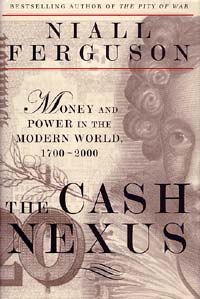
The Cash Nexus was prescient in early 2001, when it was published, and even more timely now. Events such as the terrorist attacks in New York and Washington and the financial collapse of Argentina, have spurred re-examination of globalism's basic tenets. For Ferguson, the optimism of the nineties was not so much mistaken as incomplete in its assumptions. Buoyed by misinterpretation of the Soviet Union's collapse (i.e., that it was all about jeans and rock music) it too readily assumed the strength of market economies and the weakness of other systems -- bureaucracies governed by elites; feudal monarchies; autocratic command economies. Nor did it take into account the sometimes potent resistance offered by those who stand to lose rather than gain.
No simple, causal relationship can be drawn between democracy, economic growth and peace, Ferguson argues. Indeed, "democracy is capable of generating economically perverse policies, [while] times of economic crisis (such as those caused by war) may be equally conducive to democratization." At the height of globalization, European countries demonstrated a backlash against free trade, privatization, immigration and other facets of the "new economy." Nor is the new millenium's regressive tilt unprecedented: between 1917 and 1921, democracy made major advances, only to be followed by a reversal. The market system's inherent volatility can inspire citizens to throw away their Adam Smith and go in for state socialism or an old-fashioned dictatorship; infighting among core and peripheral groups can turn virulent, provoking civil war. In 1990, the Eastern European state that seemed best poised for economic success was Yugoslavia -- but that didn't stave off a descent into chaos and violence.
Parliament grew out of the monarchy's realization that it could amass more funds for military campaigns through an elaborate system of taxation and representation than through plundering state assets. Central banks, tax bureaucracies, and even stock markets developed as part of the modern warfare state. This raises a troubling question: can political democracy and economic liberalism be separated from questions of power? The internationalism of the 1990s pointed towards a world of mutual gain in which any country could be a "winner," if it would only lower tariffs and privatize. Ferguson's more pessimistic view assumes that someone will always be calling the shots. The belief that trade agreements -- plus a few "surgical interventions" and hasty "exit strategies" -- alone can create worldwide prosperity risks becoming a self-serving fantasy. For Ferguson, American foreign policy during the nineties was guided by exactly that kind of fantasy, resulting in a half-hearted approach to its global responsibilities. Realistically, the power to influence economic and political development remains with the United States, the only nation capable of acting as a global hegemon. But during the very period when its "guiding hand" was most needed, the U.S. turned inward, avoiding sustained committments. The Cash Nexus makes a forceful case for more active U.S. involvement, though that case is weakened by the author's evident, and insufficiently examined, nostalgia for the Pax Britannia and old-style imperialism. The internationalism which he disdains arose because of the deleterious effects of nineteenth century Great Power politics. Shabby as the UN record in conflict resolution has been, it is hard to argue that the Congress of Berlin (1878) or the Paris Peace Conference (1919) did a better job."Why can't the United States today be more like the United Kingdom a hundred years ago," Ferguson asks, but Britain a hundred years ago was poised to begin a decline -- in part because it was hampered by the imperial model, with its attendant class system, cultural conservatism and inability to match the American technological edge. In other words, America succeeded in the 20th century in part because of ways it wasn't like its illustrious predecessor. Despite Ferguson's command of particulars, his book at times devolves into a frumpy polemic on How Much Better The Old Ways Were. (They weren't). On the whole, however, it's a lucid, entertaining crash course in the history of finance, and a good antidote to simple dichotomies. Many have come either to praise or to bury modern capitalism with its instruments of commerce and war, but few have so skillfully delineated its inner workings. |
|||
|
|||
|
|

